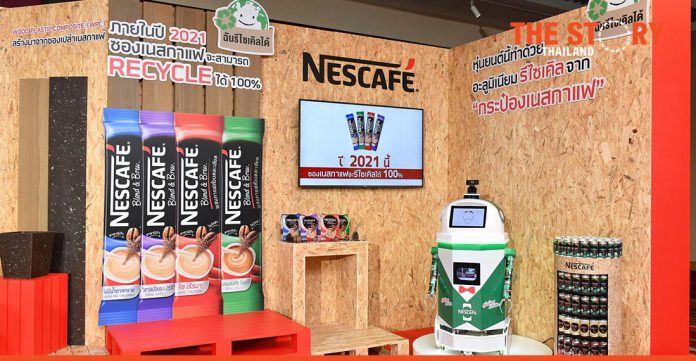Coffee firm makes furniture from used instant-coffee sachets
Packaging innovations by the familiar instant-coffee brand NESCAFÉ are carrying one of Thailand’s favorite beverages towards a waste-free future.
Among the developments revealed this month as part of NESCAFÉ’s observance of International Coffee Day on October 1 was a new monostructure plastic sachet that was developed in Thailand and has been under testing here for several months, with a view to its use throughout NESCAFÉ’s world markets. And to prove its environmentally friendly innovations, it has made dining tables for 100 schools out of recycled plastic instant-coffee sachets.
Another milestone this month is the company’s switch to 100% recycled aluminum cans for the entirety of its ready-to-drink canned coffee range, making NESCAFÉ one of the first brands in the Thai market to commit to such a change.
As part of its celebration of International Coffee Day, the company has announced a NESCAFÉ Day campaign under the concept “Nurturing Stronger Bonds, Brewing It Forward.” The Bt200-million campaign features the launch of upscale showcases that reinforce the NESCAFÉ BLEND & BREW brand’s commitment to sustainability, with upcycled items such as dining tables and eco-furniture, at NESCAFÉ Hubs and the NESCAFÉ Street Café.
The campaign is part of parent-company Nestlé’s global sustainability goal of transforming all packaging to be 100% recyclable or reusable by 2025.
It also complies with the Thailand government’s 2018-2030 plastic-waste management plan.
Quoting studies of consumer behavior by UK-based market-research firm Kantar, NESCAFÉ says 63% of Thais consider plastic waste to be one of the top five environmental concerns. Data from the Pollution Control Department shows that in 2019, Thais generated up to 1.14 kilograms of plastic waste per person per day, with about 27.04 million tons of plastic waste generated in Thailand every year.
The company has two key strategies for maintaining a sustainable business operation: introducing innovative green packaging and contributing to a waste-free future by upcycling used packaging into a variety of value-added items.
The Business Manager for Nestlé (Thailand)’s NESCAFÉ Coffee Mixes, Naritta Vipulyasekha, said that Thais drink 20,000 cups of NESCAFÉ every minute, or 300 cups every second. Her company has thus made sustainable waste management a top priority.
“Last year, we changed NESCAFÉ PROTECT PROSLIM’s secondary packaging to paper, the first time NESCAFÉ used this type of packaging anywhere in the world,” she said “This year, to improve plastic packaging, we have taken on the major challenge of making NESCAFÉ sachets more easily recyclable. Normal coffee sachets use a variety of materials to preserve the quality of the coffee they contain, and this makes them difficult to recycle.”
Working together with leading film-laminate manufacturers and research and engineering teams from Nestlé Switzerland and Singapore, Nestlé Thailand’s packaging development team developed more than 20 packaging prototypes over a two-year period.
The successful result was the world’s first monostructure plastic sachet for NESCAFÉ PROTECT PROSLIM, introduced around the middle of this year, that retains the taste, smell, and freshness of the packaged coffee while being fully designed for recycling.
“We are gradually introducing this monostructure packaging innovation across the entire NESCAFÉ BLEND & BREW product portfolio, starting with the 25% Less Sugar and No Sugar variants. This will be complete by the first quarter of next year,” Naritta said. “Thai people can be proud of this packaging innovation, as the concept was developed here, and Thailand is the first country in which it has been introduced. It will eventually expand to other markets worldwide.”
NESCAFÉ is also demonstrating the addition of value to product packaging through upcycling, which maximizes the use of plastic. Its NESCAFÉ Day campaign is using more than 100 million NESCAFÉ BLEND & BREW sachets that were sent in by Thai coffee lovers taking part in various lucky-draw campaigns over the past year.
The sachets have been upcycled into eco-friendly materials such as wood-plastic composites that have been used to make dining tables for 100 schools across the country, as well as eco-furniture for the NESCAFÉ Hubs. The eco-friendly materials made from the used sachets will also be featured at the NESCAFÉ Street Café, which will be set up as a prototype for additional locations in the future.
NESCAFÉ is also one of the first ready-to-drink canned coffee brands in the Thai market to switch entirely to 100% recycled aluminum cans. The switch will be completed this month.
NESCAFÉ’s ready-to-drink brand has also initiated a contest to create new items from used aluminum cans. The contest will run from October onwards, but already it has led to a collaborative effort with a lecturer at Rayong Polytechnic College, who created a robot prototype from used aluminum cans. It accepts voice orders from people and offers samples of drinks, and demonstrates how waste can be transformed into innovations that benefit society.
“We hope that our commitment to sustainability will inspire more Thai people to switch to green packaging, which will help to create a Thai society that is waste-free in the future,” Naritta said.
She added that there would be another special NESCAFÉ Day campaign this year – the launch of Red Pillar 2020, a concept based on the brand’s core strategy of nurturing stronger bonds with consumers.





